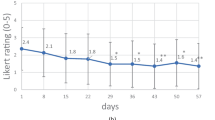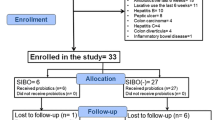Abstract
Background
In recent years, the efficacy of probiotics has received considerable attention in the treatment for irritable bowel syndrome (IBS). In this regard, a symbiotic mixture (Probinul®) has shown beneficial effects. The aim of this study was to extend the previously published 4-week randomized, double-blinded, placebo-controlled study of this symbiotic mixture.
Methods
This is an open-label prospective, partially controlled, 6-month extension period pilot study in which patients continued to receive the symbiotic mixture (Group 1) or were switched from placebo to symbiotic mixture (Group 2) using cyclic administration (last 2 weeks/month). The primary endpoints were the overall satisfactory relief of bloating and flatulence (assessed as proportions of responders). The secondary endpoints were evaluation of the symptom severity scores (bloating, flatulence, pain and urgency) and bowel function scores (frequency, consistency and incomplete evacuation).
Results
Twenty-six IBS patients completed the 6-month extension period (13 patients in Group 1 and 13 patients in Group 2). In the per-protocol analysis, the proportions of responders across time were not significantly different in the groups but in Group 2, there was an increased percentage of responders for flatulence (p = 0.07). In addition, the score of flatulence was reduced significantly during the 6-month treatment period in Group 2 (p < 0.05), while no other significant differences were detected.
Conclusions
Treatment with this symbiotic mixture was associated with persistence of relief from flatulence or new reduction in flatulence in the present 6-month long extension study. These results need to be more comprehensively assessed in large, long-term, randomized, placebo-controlled studies.



Similar content being viewed by others
References
Thompson WG, Longstreth GF, Drossman DA, Heaton KW, Irvine EJ, Muller-Lissner SA (1999) Functional bowel disorders and functional abdominal pain. Gut 45(Suppl 2):II43–II47
Brandt LJ, Chey WD, Foxx-Orenstein AE et al (2009) An evidence-based position statement on the management of irritable bowel syndrome. Am J Gastroenterol 104(Suppl 1):S1–S35
Gibson GR, Probert HM, Loo JV, Rastall RA, Roberfroid MB (2004) Dietary modulation of the human colonic microbiota: updating the concept of prebiotics. Nutr Res Rev 17:259–275
Moayyedi P, Ford AC, Talley NJ et al (2010) The efficacy of probiotics in the treatment of irritable bowel syndrome: a systematic review. Gut 59:325–332
Ritchie ML, Romanuk TN (2012) A meta-analysis of probiotic efficacy for gastrointestinal diseases. PloS One 7:e34938
Simren M, Barbara G, Flint HJ et al (2013) Intestinal microbiota in functional bowel disorders: a Rome foundation report. Gut 62:159–176
O’Mahony L, McCarthy J, Kelly P et al (2005) Lactobacillus and bifidobacterium in irritable bowel syndrome: symptom responses and relationship to cytokine profiles. Gastroenterology 128:541–551
Ohman L, Simren M (2013) Intestinal microbiota and its role in irritable bowel syndrome (IBS). Curr Gastroenterol Rep 15:323
Cappello C, Tremolaterra F, Pascariello A, Ciacci C, Iovino P (2013) A randomised clinical trial (RCT) of a symbiotic mixture in patients with irritable bowel syndrome (IBS): effects on symptoms, colonic transit and quality of life. Int J Color Dis 28:349–358
Longstreth GF, Thompson WG, Chey WD, Houghton LA, Mearin F, Spiller RC (2006) Functional bowel disorders. Gastroenterology 130:1480–1491
Lewis SJ, Heaton KW (1997) Stool form scale as a useful guide to intestinal transit time. Scand J Gastroenterol 32:920–924
Heaton KW, Radvan J, Cripps H, Mountford RA, Braddon FE, Hughes AO (1992) Defecation frequency and timing, and stool form in the general population: a prospective study. Gut 33:818–824
Heaton KW, O’Donnell LJ (1994) An office guide to whole-gut transit time. Patients’ recollection of their stool form. J Clin Gastroenterol 19:28–30
Heaton KW, Ghosh S, Braddon FE (1991) How bad are the symptoms and bowel dysfunction of patients with the irritable bowel syndrome? A prospective, controlled study with emphasis on stool form. Gut 32:73–79
Ringel Y, Williams RE, Kalilani L, Cook SF (2009) Prevalence, characteristics, and impact of bloating symptoms in patients with irritable bowel syndrome. Clin Gastroenterol Hepatol 7:68–72
Caldarella MP, Serra J, Azpiroz F, Malagelada JR (2002) Prokinetic effects in patients with intestinal gas retention. Gastroenterology 122:1748–1755
Coleski R, Owyang C, Hasler WL (2006) Modulation of intestinal gas dynamics in healthy human volunteers by the 5-HT receptor agonist tegaserod. Am J Gastroenterol 101:1858–1865
Villoria A, Serra J, Azpiroz F, Malagelada JR (2006) Physical activity and intestinal gas clearance in patients with bloating. Am J Gastroenterol 101:2552–2557
Tremolaterra F, Pascariello A, Gallotta S, Ciacci C, Iovino P (2013) Colonic gas transit in patients with bloating: the effect of an electromechanical stimulator of the abdominal wall. Tech Coloproctol 17:405–410
Whorwell PJ, Altringer L, Morel J et al (2006) Efficacy of an encapsulated probiotic Bifidobacterium infantis 35624 in women with irritable bowel syndrome. Am J Gastroenterol 101:1581–1590
Kim HJ, Camilleri M, McKinzie S et al (2003) A randomized controlled trial of a probiotic, VSL#3, on gut transit and symptoms in diarrhoea- predominant irritable bowel syndrome. Aliment Pharmacol Ther 17:895–904
Kim HJ, Vazquez Roque MI, Camilleri M et al (2005) A randomized controlled trial of a probiotic combination VSL# 3 and placebo in irritable bowel syndrome with bloating. Neurogastroenterol Motil 17:687–696
Ringel-Kulka T, Palsson OS, Maier D et al (2011) Probiotic bacteria Lactobacillus acidophilus NCFM and Bifidobacterium lactis Bi-07 versus placebo for the symptoms of bloating in patients with functional bowel disorders: a double-blind study. J Clin Gastroenterol 45:518–525
Spiller R (2008) Review article: probiotics and prebiotics in irritable bowel syndrome. Aliment Pharmacol Ther 28:385–396
Brenner DM, Moeller MJ, Chey WD, Schoenfeld PS (2009) The utility of probiotics in the treatment of irritable bowel syndrome: a systematic review. Am J Gastroenterol 104:1033–1049
Schrezenmeir J, de Vrese M (2001) Probiotics, prebiotics, and synbiotics–approaching a definition. Am J Clin Nutr 73:S361–S364
Ng SC, Hart AL, Kamm MA, Stagg AJ, Knight SC (2009) Mechanisms of action of probiotics: recent advances. Inflamm Bowel Dis 15:300–310
Forsythe P, Bienenstock J (2010) Immunomodulation by commensal and probiotic bacteria. Immunol Invest 39:429–448
Ohland CL, Macnaughton WK (2010) Probiotic bacteria and intestinal epithelial barrier function. Am J Physiol Gastrointest Liver Physiol 298:G807–G819
Poulton EC, Freeman PR (1966) Unwanted asymmetrical transfer effects with balanced experimental designs. Psychol Bull 66:1–8
Cook TDCT (1979) Quasi-experimentation: design & analysis issues for field studies. Houghton Mifflin Co, Boston
Bramwell ATBAJ, Morrissey SJ (1992) Repeated-measures analysis: issue and options. Int J Ind Ergon 10:185–197
Rosenthal R (1966) Experimental effects in behavioral research. Appleton-Century-Crofts, New York
Hrobjartsson A (2002) What are the main methodological problems in the estimation of placebo effects? J Clin Epidemiol 55:430–435
Conflict of interest
None.
Author information
Authors and Affiliations
Corresponding author
Rights and permissions
About this article
Cite this article
Bucci, C., Tremolaterra, F., Gallotta, S. et al. A pilot study on the effect of a symbiotic mixture in irritable bowel syndrome: an open-label, partially controlled, 6-month extension of a previously published trial. Tech Coloproctol 18, 345–353 (2014). https://doi.org/10.1007/s10151-013-1055-2
Received:
Accepted:
Published:
Issue Date:
DOI: https://doi.org/10.1007/s10151-013-1055-2




